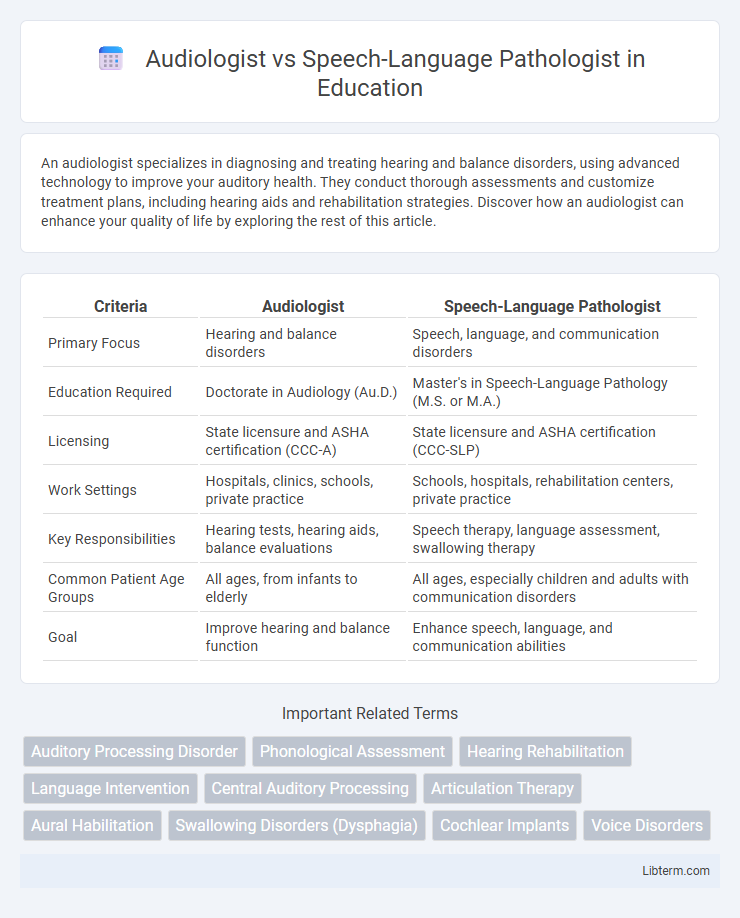An audiologist specializes in diagnosing and treating hearing and balance disorders, using advanced technology to improve your auditory health. They conduct thorough assessments and customize treatment plans, including hearing aids and rehabilitation strategies. Discover how an audiologist can enhance your quality of life by exploring the rest of this article.
Table of Comparison
| Criteria | Audiologist | Speech-Language Pathologist |
|---|---|---|
| Primary Focus | Hearing and balance disorders | Speech, language, and communication disorders |
| Education Required | Doctorate in Audiology (Au.D.) | Master's in Speech-Language Pathology (M.S. or M.A.) |
| Licensing | State licensure and ASHA certification (CCC-A) | State licensure and ASHA certification (CCC-SLP) |
| Work Settings | Hospitals, clinics, schools, private practice | Schools, hospitals, rehabilitation centers, private practice |
| Key Responsibilities | Hearing tests, hearing aids, balance evaluations | Speech therapy, language assessment, swallowing therapy |
| Common Patient Age Groups | All ages, from infants to elderly | All ages, especially children and adults with communication disorders |
| Goal | Improve hearing and balance function | Enhance speech, language, and communication abilities |
Introduction to Audiologists and Speech-Language Pathologists
Audiologists specialize in diagnosing and treating hearing and balance disorders, using advanced technology to assess auditory function and fit hearing aids. Speech-language pathologists evaluate and treat communication disorders, including speech, language, voice, and swallowing difficulties across all age groups. Both professionals collaborate to improve patients' communication abilities and overall quality of life.
Educational Background and Training
Audiologists typically earn a Doctor of Audiology (AuD) degree, which requires about four years of professional study after completing a bachelor's degree, focusing on hearing and balance disorders. Speech-Language Pathologists usually obtain a master's degree in speech-language pathology, involving clinical practicum experiences and coursework centered on communication disorders and therapy techniques. Both professions require state licensure and certifications, such as the Certificate of Clinical Competence (CCC) from the American Speech-Language-Hearing Association (ASHA), to ensure competency and adherence to professional standards.
Scope of Practice: Audiologist
Audiologists specialize in diagnosing and treating auditory and vestibular disorders, focusing on hearing loss, balance issues, and auditory processing problems. Their scope of practice includes performing hearing tests, fitting and managing hearing aids, cochlear implants, and providing auditory rehabilitation. Audiologists also assess tinnitus and provide counseling on hearing health and prevention strategies.
Scope of Practice: Speech-Language Pathologist
Speech-Language Pathologists specialize in diagnosing and treating communication disorders, including speech, language, voice, and fluency issues, as well as swallowing disorders. Their scope of practice involves conducting assessments, developing individualized therapy plans, and providing intervention for conditions such as aphasia, stuttering, and apraxia of speech. Unlike Audiologists who focus on hearing and balance, Speech-Language Pathologists primarily address speech production, language comprehension, and cognitive-communication impairments.
Key Differences Between Audiologists and Speech-Language Pathologists
Audiologists specialize in diagnosing and treating hearing and balance disorders, using tools like audiometry and hearing aids, while Speech-Language Pathologists focus on evaluating and treating communication disorders, including speech, language, and swallowing difficulties. Audiologists often work with patients experiencing hearing loss, tinnitus, or vestibular issues, whereas Speech-Language Pathologists address conditions such as stuttering, aphasia, and dysphagia. The scope of practice differentiates significantly, with audiologists concentrating on audiological assessments and rehabilitation, and speech-language pathologists emphasizing speech therapy and communication enhancement.
Common Conditions Treated by Audiologists
Audiologists primarily treat common conditions such as hearing loss, tinnitus, balance disorders, and auditory processing disorders. They conduct comprehensive hearing evaluations, fit hearing aids, and provide auditory rehabilitation. Unlike speech-language pathologists who focus on speech and language impairments, audiologists specialize in diagnosing and managing auditory and vestibular system disorders.
Common Conditions Treated by Speech-Language Pathologists
Speech-Language Pathologists primarily treat conditions such as speech sound disorders, language delays, stuttering, and aphasia resulting from stroke or brain injury. They also address developmental disorders like autism spectrum disorder and cognitive-communication impairments. Their therapy targets improving communication skills and swallowing functions in patients across all age groups.
Settings Where These Professionals Work
Audiologists primarily work in hospitals, hearing clinics, and private practices specializing in diagnosing and treating hearing and balance disorders. Speech-language pathologists are commonly found in schools, rehabilitation centers, and outpatient clinics, focusing on speech, language, and swallowing disorders. Both professionals often collaborate in multidisciplinary healthcare settings to address communication and auditory needs comprehensively.
Collaborative Roles in Healthcare
Audiologists and speech-language pathologists work collaboratively in healthcare to diagnose and treat communication and swallowing disorders, often sharing patient data to create comprehensive care plans. Audiologists specialize in hearing and balance assessments, while speech-language pathologists focus on speech, language, and cognitive-communication therapy. Their integrated approach enhances patient outcomes by addressing overlapping conditions such as auditory processing disorders and language delays.
Choosing the Right Specialist for Your Needs
Choosing the right specialist depends on whether your concerns involve hearing or communication disorders; audiologists specialize in diagnosing and treating hearing loss and balance issues, while speech-language pathologists focus on speech, language, and swallowing disorders. Audiologists conduct hearing tests, fit hearing aids, and manage auditory processing problems, whereas speech-language pathologists assess and treat speech delays, articulation problems, and language comprehension difficulties. Understanding the nature of the issue ensures effective treatment and better outcomes by directing patients to the expertise of the appropriate clinician.
Audiologist Infographic

 libterm.com
libterm.com